八年级英语下册unit1what’sthemattersectionb2c_selfcheck同步测试人教新目标版49
人教版初二(下)英语unit1 what's the matter知识点讲解与练习

八年级下册英语Unit 1 what’s the matter?词汇篇学生通过本讲学习,能够掌握本单元的重点词汇句型,并在综合能力上有一定的拓展。
1.matter的用法(1)名词:事情,问题What’s the matter? =what’s wrong (with you)? =what’s the trouble怎么啦?出什么事啦?(2)动词:有重大影响,有重要性如:What does it matter?2.疾病的表达法have a cold/a fever/ a toothache/ a stomachache3.take 的固定搭配take one’s temperature/ take breaks/ take risks/take some medicine/take off/ take care of/take away 4.surprise的用法1.做名词:to one’s surprise 使。
惊讶的,出乎。
意料2.做动词:surprise sb使某人吃惊3.做形容词:surprising, surprised的用法5.get的用法get off下车/get on上车/get into陷入,参与6.be used to sth/doing sth 习惯于做某事be used to do sth 被用作去做某事used to do sth 习惯于做某事7.out of的固定搭配look out of 向。
外看/ get out of从。
出来/ run out of用光基础演练1.---What’s wrong ______you?---I fell off the bike and hurt my leg.A. ofB. withC. forD. by2.Tom and Jenny enjoyed _________playing computer games.A. himselfB. herselfC. ourselvesD. themselves3. Sally became interested ___________science and wanted to be a scientist.A. forB. inC. throughD. at4. ---I had a __________.---You’d better go to see a dentist.A. headacheB. feverC. coldD. toothache5. I didn’t _________my temperature, but I knew I had a fever.A. giveB. setC. takeD. show二、根据汉语意思翻译句子。
人教新目标版英语八下Unit1《What’sthematter》(SectionB(第5课时)说课稿
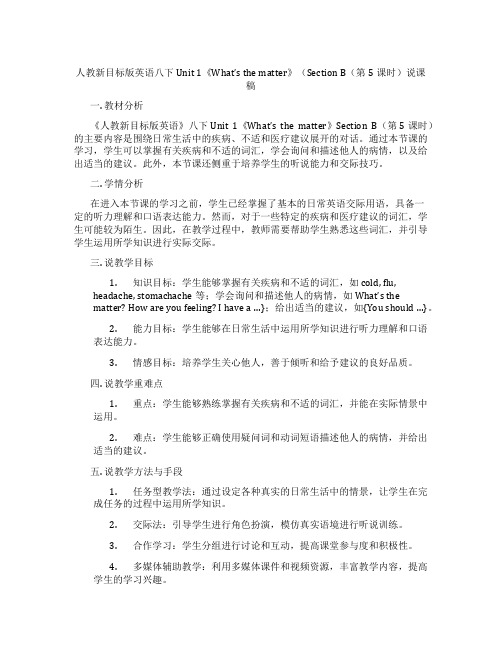
人教新目标版英语八下Unit 1《What’s the matter》(Section B(第5课时)说课稿一. 教材分析《人教新目标版英语》八下Unit 1《What’s the matter》Section B(第5课时)的主要内容是围绕日常生活中的疾病、不适和医疗建议展开的对话。
通过本节课的学习,学生可以掌握有关疾病和不适的词汇,学会询问和描述他人的病情,以及给出适当的建议。
此外,本节课还侧重于培养学生的听说能力和交际技巧。
二. 学情分析在进入本节课的学习之前,学生已经掌握了基本的日常英语交际用语,具备一定的听力理解和口语表达能力。
然而,对于一些特定的疾病和医疗建议的词汇,学生可能较为陌生。
因此,在教学过程中,教师需要帮助学生熟悉这些词汇,并引导学生运用所学知识进行实际交际。
三. 说教学目标1.知识目标:学生能够掌握有关疾病和不适的词汇,如cold, flu,headache, stomachache等;学会询问和描述他人的病情,如What’s thematter? How are you feeling? I have a …};给出适当的建议,如{You should …}。
2.能力目标:学生能够在日常生活中运用所学知识进行听力理解和口语表达能力。
3.情感目标:培养学生关心他人,善于倾听和给予建议的良好品质。
四. 说教学重难点1.重点:学生能够熟练掌握有关疾病和不适的词汇,并能在实际情景中运用。
2.难点:学生能够正确使用疑问词和动词短语描述他人的病情,并给出适当的建议。
五. 说教学方法与手段1.任务型教学法:通过设定各种真实的日常生活中的情景,让学生在完成任务的过程中运用所学知识。
2.交际法:引导学生进行角色扮演,模仿真实语境进行听说训练。
3.合作学习:学生分组进行讨论和互动,提高课堂参与度和积极性。
4.多媒体辅助教学:利用多媒体课件和视频资源,丰富教学内容,提高学生的学习兴趣。
六. 说教学过程1.导入:通过谈论日常生活中的常见疾病和不适,引起学生对主题的兴趣。
八年级英语下册Unit1What'sthematterSectionB课件(新版)人教新目标版

3. _____________ 登山者;攀登者 4. ____c_l_im__b_e_r___ (交通)事故;意外遭遇
5. ____a_c_c_i_d_e_n_t__ 千克;公斤
6. ______k_il_o_____ 岩石 7. ______r_o_c_k____ 刀 8. _____k_n_if_e_____ 血
第九页,共36页。
I'm never interested in watching crosstalk. 我从来不曾对观 看相声表演感兴趣。 【熟记(shú jì)】take/have an interest in (doing)…=be/get/ become interested in (doing)… 对(做)……感兴趣 places of interest 名胜
英语(yīnɡ yǔ) 八年级 下册 配人教(新目 标)版
Unit 1 What's the matter?
Section B
第一页,共36页。
课前预习
一、重点单词 1. _____k_n_e_e_____ 膝;膝盖 2. _____________ (we的反身代词(fǎn shēn dài cí))我们自己
继续或坚持做某事
23. havkeeeap_______o_n__ ___________遭遇(zāoyù)严重意外
24. go ______s_e_r_io_u_s_____a__c_c_id_e去n爬t 山
25. _____m_o_u_n_t_a_in_____放cl弃imbing
give
up
第六页,共36页。
usually offered tea by the host. (2016长沙)
上课八年级下Unit1_What's_the_matter全单元
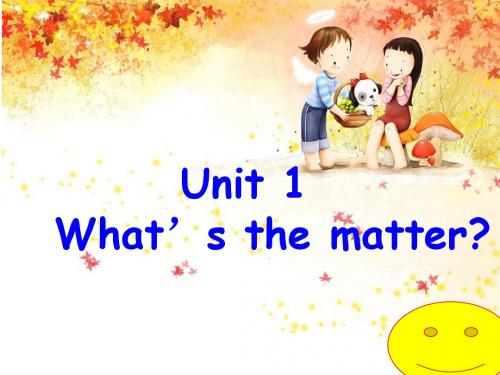
have a sore throat
I have a sore throat . My throat is sore. My throat hurts.
我喉咙痛。
hurt
My leg _____. hurts I _____ hurt my leg.
have a sore back
背痛
have a sore throat
talk loudly.
A:What’s the matter? a toothache ? Do you have______________ B:Yes, I do. A:You should______________. see a dentist You shouldn't ___________________. eat sweet things .
have a (bad) cold 感冒
have a stomachache 胃痛
What’s the matter with her? She has a (bad) toothache.
她牙痛。
have a toothache 牙痛
have a headache 头痛
What’s the matter with him ? He has/has got a stomachache.
名词后缀-ache表示部位疼痛
tooth+ ache = toothache (牙痛)
head+ache = headache (头痛) back+ache=backache(背痛) stomach +ache = stomachache(胃痛) ear+ache=earache (耳朵痛) heart+ache=heartache(心脏病)
八下Unit1What’sthematter短语语法知识点
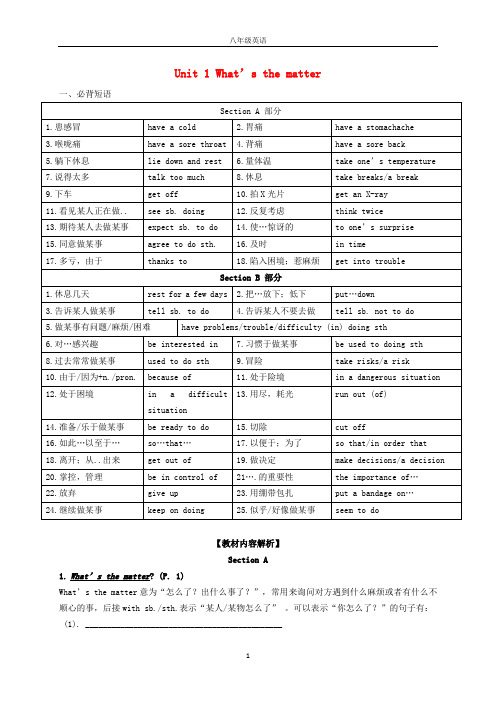
Unit 1 What’s the matter一、必背短语【教材内容解析】Section A1.What’s the matter? (P. 1)What’s the matter意为“怎么了?出什么事了?”,常用来询问对方遇到什么麻烦或者有什么不顺心的事,后接with sb./sth.表示“某人/某物怎么了”。
可以表示“你怎么了?”的句子有: (1). _____________________________________________(2). _____________________________________________(3)._____________________________________________(4). _____________________________________________(5). _____________________________________________(6). _____________________________________________2.I have a stomachache. (P. 1)stomachache用作名词,表示“胃疼、腹疼”,是一个复合名词,含有后缀ache的常见复合词还有:头痛 ______________;牙痛_________________;耳痛 ________________3.have a sore throat (P. 1)sore是形容词,意为“疼痛的,酸痛的”可作定语或表语。
常见短语:喉咙痛:_______________________后背痛:_______________________4.lie down and rest. (P. 2)(1). lie down意为“躺下”。
【拓展1】lie用作动词可以表示“躺”或者“位于”,还可以表示“撒谎”。
She is lying in bed with a bad cold. 英译汉_________________________________Beijing lies in the north of China. 英译汉__________________________________It is a bad habit to lie. 英译汉___________________________________________【拓展2】lie及lay一词多义(2). rest此处用作动词,表示“休息”,rest也可以用作名词,表示“休息”,常用的短语为“休息”:_______________________.例句:Let’s stop working and have a rest.5.Maybe you have a fever...(P. 2)maybe作副词,表示“可能、也许”,常常放在句首,相当于perhaps,可以与may be相互转换。
初二下册单元英语知识点:Unit1What’sthematter-

初二下册单元英语知识点:Unit1What’sthematter?初二下册单元英语知识点:Unit1hat’stheatter?Unit1hat’stheatter?一、基础知识hat’stheatter?怎么啦?出什么事情了?【解析】atter/'ætə)/n.问题;事情hat’stheatterithyou?=hat’sthetroubleithyou?=hat’srongithyou?你怎么了?【注】:atter和trouble为名词,其前可加the或形容词性物主代词,rong是ad不能加the【用法】用于询问某人有什么病或某人遇到什么麻烦、问题其后跟询问对象时,与介词ith 连用。
即:hat’stheatterithsb.?=hat’syourtrouble?=hat’sup?=hathappenstosb.?—hat’stheatterithyou?—Ihaveabadcold.2.Ihadacold.我感冒了。
haveacold=catchacold=havetheflu感冒haveafever发烧haveacough咳嗽haveastoachache胃疼,肚子疼haveatoothache牙疼haveaheadache头疼3.身体部位+ache 构成新的复合词stoach+ache=stoachachehead+ache=headachetooth+ache= toothachebac+ache=bacache后背痛4.uchtoo+形容词,意为太......,toouch+名词,意为很多,大量。
5.enough【形容、副词】足够的/地,enough放在名前后,形副后。
goodenough足够好,enoughoney=uchoney6.liedon躺下,lie躺,躺着,过去式lay;lie说谎,过去式lied7.aybe “或许”,常用于句首,表示可能性,后加句子。
人教新目标八下课件:Unit1 What's the matter(Section B2 3a-Self check)

Fill in the blanks. Aron Ralston is an American mountain 1_______. There were many times climber when Aron almost lost his life because 2___ accident. of On April 26, 2003, He found himself in a very dangerous 3________ when climbing in Utah. On situation that day, Aron’s arm was caught under a 360-kilo rock that fell
zxxk
knife to 8___ cut off half his right arm. Then, with his left arm, he bandaged himself so 9_____ that he would not lose too much 10_______. blood After that , he climbed down the mountain to find help. His love for mountain climbing so is 11___ great that he kept on climbing 12_________ mountains even after thist’s the matter?
I was making dinner just now and I cut myself accident.
You should put some medicine on it.
1 Write different health problems next to the body parts. Then write more health problems you know of.
盘山县第八中学八年级英语下册Unit1What'sthematter必记单词+重点短语+重点句子+交
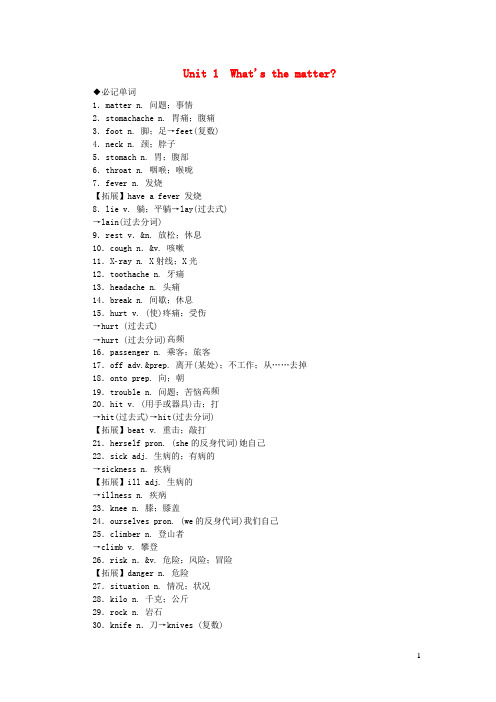
Unit 1 What's the matter?◆必记单词1.matter n. 问题;事情2.stomachache n. 胃痛;腹痛3.foot n. 脚;足→feet(复数)4.neck n. 颈;脖子5.stomach n. 胃;腹部6.throat n. 咽喉;喉咙7.fever n. 发烧【拓展】have a fever 发烧8.lie v. 躺;平躺→lay(过去式)→lain(过去分词)9.rest v.&n. 放松;休息10.cough n.&v. 咳嗽11.Xray n. X射线;X光12.toothache n. 牙痛13.headache n. 头痛14.break n. 间歇;休息15.hurt v. (使)疼痛;受伤→hurt (过去式)→hurt (过去分词)高频16.passenger n. 乘客;旅客17.off adv.&prep. 离开(某处);不工作;从……去掉18.onto prep. 向;朝19.trouble n. 问题;苦恼高频20.hit v. (用手或器具)击;打→hit(过去式)→hit(过去分词)【拓展】beat v. 重击;敲打21.herself pron. (she的反身代词)她自己22.sick adj. 生病的;有病的→sickness n. 疾病【拓展】ill adj. 生病的→illness n. 疾病23.knee n. 膝;膝盖24.ourselves pron. (we的反身代词)我们自己25.climber n. 登山者→climb v. 攀登26.risk n.&v. 危险;风险;冒险【拓展】danger n. 危险27.situation n. 情况;状况28.kilo n. 千克;公斤29.rock n. 岩石30.knife n.刀→knives (复数)31.blood n. 血32.mean v. 意思是;打算;意欲→meaning n. 意思;含义33.importance n. 重要性;重要→important adj. 重要的高频34.decision n. 决定;抉择→decide v. 决定高频35.control n.&v. 限制;约束;管理36.spirit n. 勇气;意志37.death n. 死;死亡→die v. 死→dead adj. 死的高频38.nurse n. 护士◆重点短语1.have a cold 感冒2.have a stomachache 胃疼3.have a sore back 背疼4.lie down 躺下5.see a dentist 看牙医6.take one's temperature 量体温7.have a fever 发烧8.take breaks (take a break) 休息9.in the same way 用同样的方式【拓展】in a way以某种方式on the way在路上by the way 顺便说一声10.go to a doctor 看医生高频【拓展】see a doctor看医生11.get off 下车12.to one's surprise 使……惊讶的;出乎……意料高频【拓展】in surprise 惊讶地13.thanks to 多亏;由于【拓展】thanks for sth. 为……而表示感谢14.in time 及时【拓展】on time 准时15.think about 考虑16.right away 立刻;马上17.get into trouble 陷入麻烦【拓展】be in trouble 有麻烦;遇到困难18.be used to 习惯于……;适应于……19.fall down 摔倒【拓展】fall asleep 入睡fall off 摔下fall behind 落后fall in love with 爱上20.have problems (in) doing sth. 做某事有困难21.take risks (take a risk) 冒险22.run out (of) 用尽;耗尽【拓展】use up用尽;用光23.be ready to do sth. 准备做某事【拓展】get ready for sth. 为某事做好准备24.cut off 切除【拓展】cut up 切碎25.get out of 离开;从……出来高频26.be in control of 掌管;管理27.make a decision 作决定高频28.give up 放弃高频◆重点句子1.What's the matter?怎么了?2.Should I take my temperature?我应该量体温吗?3.At 9:00 a.m. yesterday,bus No.26 was going along Zhonghua Road when the driver saw an old man lying on the side of the road.昨天上午九点,26路公交车正行驶在中华路上,这时司机看到一位老人躺在路边。
八年级下册unit1_what‘s_the_matter课文重难点讲解

Unit 1 What’s the matter?Section A1. What’ s the matter? 怎么啦?出什么事情了?【解析】matter/ ' mætə(r)) /n.问题;事情What’ s the matter with you?= What’s the trouble with you?= What’ s wrong with you?你怎么了?【注】:matter 和trouble 为名词,其前可加the 或形容词性物主代词,wrong 是adj. 不能加the【2013自贡3】18. —What’s the matter ______ Tom. He is wet through.—His car ran _______ the river.A.with; inB.to; intoC.with; into【用法】用于询问某人有什么病或某人遇到什么麻烦、问题其后跟询问对象时,与介词with连用。
即:What’s the matter with sb.?= What’s your trouble?= What’s up?= What happens to sb.?—What’s the matter with you ?—I have a bad cold.( ) ①What’s ____ with you?A. troubleB. the matterC. the wrongD. matter( )②—______?—Nothing serious , but a bit tired.—Better have a rest now, dear.A. Is that allB. Is there anything elseC. What’s thisD. What’s the matter with you【2013湖北孝感】—_________?—I have a headache and I don’t feel like eating anything.A. How are youB. What can I do for youC. What’s the matter with youD. How do you like it【2011.云南昆明】27. —What’s the matter with Tina?—_______________.A. She is away.B. She is cool.C. She has a sore throat.D. She should take some medicine【拓展】matter的用法(1) It doesn’t matter 没关系(用来回答别人道歉时的用语)( ) —I’m sorry to break your pen. —_______A. That’s rightB.It doesn’t matterC. Thank you【2013江苏徐州】3. —Please don't throw paper on the ground.—________,I won't.A. Excuse meB. That's all rightC. SorryD. It doesn't matter【2013黑龙江齐齐哈尔】17.-I have a pain in my back.-_____ . You’d better see a doctor.A. I’m sorry to hear thatB. Nothing seriousC. It doesn’t matter【2013湖北武汉】39. —I’m very sorry. I broke your tea cup.—__________.A. It doesn’t matterB. You’d better notC. Take it easyD. It’s too bad【2013四川广安】26.—Sorry, I'm late again.—______.A.That’s OK B.It doesn't matter C.Good idea (2) as a matter of fact= in fact 事实上, 实际上2. I have a cold 我感冒了I have a stomachache 我患胃痛I have a sore back. 我背痛。
人教版八年级英语下册Unit 1 What’s the matterSection B (1a-1d
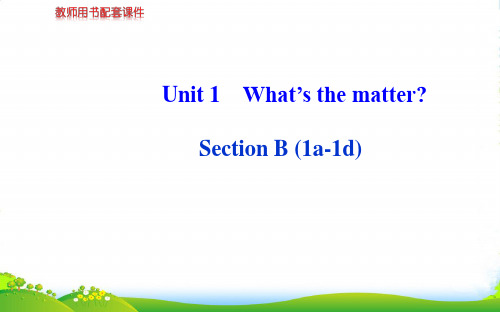
1. If you have a
, you should put your head back.
2. Bob hurt
in P. E. class and he couldn’t move.
3. She
her finger while getting ready for the supper
yesterday.
What happened? 发生了什么事? 【自主领悟】 happen意为“发生”, 为不及物动词, 常表示某事发生的偶然 性。例如: On their way to work, they saw an accident happen on the street. 在上班的路上, 他们看到街上发生了一起事故。
【活学活用】
①—What happened
Mr. Smith yesterday?
—He fell down and hurt his leg.
A. to
B. on
②Great changes have
C. with
D. for
in my hometown these years.
A. happen
(3)“sb. +happen+ _t_o_d_o_sth. ”意为“某人碰巧做某事”。 例如: I happened to meet an old friend of mine in the street yesterday. 昨天我在街上碰巧遇到了一位老朋友。
【误区警示】 (1)happen为不及物动词, 不能用于被动语态。 (2)happen为短暂性动词, 不能与表示一段时间的状语连用。 (3)happen一般用来强调某事发生的偶然性。如要表示事先 安排或有准备的事情或活动, 则不能用happen, 而要用 _ta_k_e__p_la_c_e_。
Unit1 what's the matter sectionB(1a-1d)课件
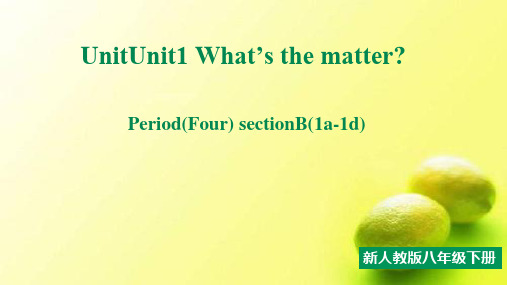
Period(Four) sectionB(1a-1d)
新人教版八年级下册
Objectives
1. Learn to use new words & expressions: bandage press sick knee nosebleed put a bandage on; run it under water; get hit on the head; hurt one’s back…
He should _ca_l_l_1_2_0__fo_r__h_e_lp__a_n_d__g_et__a_n_X__-r_a_y__.
I cut my finger when peeling an apple with a knife accidently. It was bleeding. What should I do?
When someone hurt his back …
What should you do?
When your knee got hurt …
What should you do?
When your sister is sick …
What should you do?
When someone got hit on the head …
拍个X光片。
__3__ Rest for a few days.
休息几天。
__2__ Press the sides of your nose.
按你鼻子的两侧。
__1__ Put your head down.
把头低下。
__3__ Clean your face.
Unit1what’sthematter_SectionA知识点梳理人教版八年级英语下册

人教版八年级下册英语课本知识点梳理Unit 1 wh at’s the matter? sectionA课文内容:What's the matter? 怎么了? (教材第1页)【用法详解】What's the matter? 怎么了?/出什么事了?常用于询问某人患了何种疾病,遇到了什么困难等,也可用于询问某物出了什么故障,其后可接with sb./sth.,表示“某人/某物怎么了?”。
其中matter 用作名词,意为“问题;事情”matter前须加定冠词the。
【例句】What's the matter? 怎么了?Bad luck.I lost my pen. 真倒霉,我弄丢了钢笔.What's the matter with him? 他怎么了?He has a sore back.他背痛【拓展】matter[动词] 要紧;有关系多用在否定句、疑问句或条件句中It doesn't matter.没关系。
(通常用来回答对方的道歉)I have a cold. 我感冒了。
(教材第1页)【用法详解】have a cold (患)感冒。
其中have 用作及物动词,意为“患(病);遭受(病痛)”,常用于结构“have a/an +疾病名称”表示患病或身体某部位不舒服。
此时它不能用于进行时态,其第三人称单数形式为has,过去式为had。
常见的表示病痛的短语还有:have a fever 发烧have a toothache 牙疼have a headache头痛have a cough 咳嗽have a stomachache胃痛Do you often have a cold? 你经常感冒吗?Jim had a stomachache after supper yesterday.吉姆昨天晚饭后胃痛。
l have a stomachache.我胃痛。
( 教材第1 页)【用法详解】stomachache [名词]胃痛;腹痛是由“名词stomach(;腹部)+ache(疼痛)”构成的复合名词。
八年级英语下册Unit1What27s the matter课文内容

Unit 1 What’s the matterSection AA1:What’s the matter B1:I have a cold.A2:What’s the matter B2:I have a stomachache.1a Write the each part of the body.arm__back__ear__eye__foot__hand__head__leg___mouth___neck____nose___stomach____tooth____1c Make conversations.A: What’s the matter with JudyB:She talked too much yesterday and didn’t drink enough water. She has a very sore throat now. 2a Match the problems with the advice.down and restsome hot tea with honeyand sore throat a dentist and get an X-rayyour temperaturemyself some medicine on it2d Role-play the conversation.Mandy:Lisa,are you OKLisa: I have a headache and I can’t move my neck. What should I doShould I take my temperatureMandy:No,it doesn’t sound like you have a did you do on the weekendLisa: I played computer games all weekend.Mandy:That’s probablywhy. You need to take breaks away from the computer.Lisa: Yeah,I think I sat in the same way for too long without moving.Mandy:I think you should lie down and rest. If your head and neck still hurt tomorrow,then go to a doctor.Lisa: ,Mandy.3a Read the passage. Do you think it comes from a newspaper or a book How do you knowAt 9:oo . yesterday,bus was going along Zhonghua Road when the driver saw an old man lying onthe side of the woman next to him was shouting for help.The bus driver,24-year-old Wang Ping,stopped the bus without thinking got off and asked the womanwhat happened. She said that the man had a heart problem and should go to the hospital. Mr Wang knew he had topassengers to get off and wait for the next bus. But to his surprise,they all agreed to go with passengers helped Mr. Wang to move the man onto the bus.Thanks to Mr. Wang and the passengers,the doctors saved the man in time. “It’s sad that many people don’t wantto help others because they don’t want any trouble,”says one passenger.”But the driver didn’t think about himself.He only thought about saving a life.”the passage again and check the things that happened in the story.Ping was the driver of bus at 9:00 . yesterday.hit an old man on Zhonghua Road.old man had a heart problem and needed go to the hospital right away.passengers in the bus did not want to go to the hospital,so only Wang Ping went with the old man.passengers helped to get the old man onto the bus.old man got to the hospital in time.Grammar FocusWhat’s the matter I have a stomachache. You shouldn’t eat so much next time. What’s the matter with Ben He hurt himself. He has a sore back. He should lie down and rest.Do you have a fever Yes,I do./No,I don’t./I don’t know.Does he have a toothache Yes,he does. He should see a dentist and get an X-ray. What should she do She should take her temperature.Should I put some medicine on it Yes,you should./No,you shouldn’t.4a Fill in the blanks and practice the conversation.A: I hurt ____when I played basketball yesterday. What___I do B:You___see a doctor and get an X-ray.A:_______the matter B:My sister and I___sore throats. ______we go to school A:No,you ______.A:_______Mike____a fever B:No,he____. He _____a stomachache. A:He___drink some hot tea.4b Circle the best advice for these health problems. Then add your own advice.cut herself. She should(get an X-ray/put some medicine on the cut).My advice:___________________________________________has a toothache. She should(see a dentist/get some help).My advice:___________________________________________and Sue have colds. They shouldn’t (sleep/exercise).My advice:__________________________________________has a sore back. He should(lie down and rest/take his temperature)My advice:_________________________________________4c A:What’s the matterDid you hurt yourself playing soccerB:No,I didn’t.A: Did you fall downUnit 1 What’s the matter Section B1a When these accidents happen,what should you doPut the actions in order.your hand ___Put a bandage on it. ______Run it under water. _____Put some medicine on it.down ___Go to the hospital. ___Get an X-ray. _____Rest for a few days.a nosebleed _____Clean your face ___Put your head back. ______Put on a clean T-shirt.1b 1c Write the letter of each treatment next to the problems.Problems Treatmentsfelt sick. ________ a bandage on it.cut his his temperaturehad a him to resthad a some medicine on ithurt his him to the hospital to get an X-raygot hit on the her to put her bead back2a Accidents or problems can sometimes happen when we do sports. Write the letter of each sport next to each accident or problem thadt can happen.A=soccer B=mountain climbing C=swimming__fall down__have problems breathing__get hit by a ball__get sunburned__cut ourselves__hurt our back or armthe passage and underline the words you don’t know. Then look up the words in a dictionary and write down their meanings.Finding the Order of Events Writers describe events in a certain order. Finding the order of the events will help you understand what you are reading.He Lost His Arm But Is Still ClimbingAron Ralston is an American man who is interested in mountain climbing. As a mountain climber, Aron is used to taking risks. This is one of the exciting things about doing dangerous sports. There were many times when Aron almost lost his life because of accidents. On April 26,2003,he found himself in a very dangerous situation when climbing in Utah. On that day,Aron’s arm was caught under a 2,000-kilo rock that fell on him when he was climbing by himself in the mountains. Because he could not free his arm , he stayed there for five days and hopedthat someone would find him. But when his water ran out,he knew that he would have to do something to save hisown life. He was not ready to die that day. So he used his knife to cut off half his right arm. Then, with his left arm , he bandaged himself so that he would not lose too much blood. After that, he climbed down the mountain tofind help.After losing his arm,he wrote a book called Between a Rock and a Hard Place. This means being in a difficult situation that you cannot seem to get out of. In this book, Aron tells of the importance of making goodmountains even after this experience.Do we have the same spirit as Aron Let’s think about it before we find ourselves “between a rock and a hard place”,and before we have to make a decision that could mean life or death.2c Read the statements and circle True,False or Don’t Know.almost lost his life three times because of climbing accidents. TRUE FALSE DON’T KNOWhad a serious accident in April 2003. TRUE FALSE DON’T KNOWran out of water after three days. TRUE FALSE DON’T KNOWwrote his book before his serious accident. TRUE FALSE DON’T KNOWstill goes mountain climbing. TRUE FALSE DON’T KNOW2d Read the passage again and answer the questions.Where did the accident happen on April 26,2003__________________________________Why couldn’t Aron move_______________________________________________How did Aron free himself__________________________________________________What did Aron do after accident________________________________________________What does “between a rock and a hard place” mean______________________________2e Put the sentences in the correct order. Then use them to tell Aron’s story to your partner. Try to add other details from the reading._____On April 26,2003,he had a serious mountain climbing accident._____Aron loves mountain climbing and doesn’t mind taking risks._____Aron did not give up after the accident and keeps on climbing mountains today._____He wrote a book about his experience._____Aron lost half his right arm from the 2003 accident.Self Checkdifferent health problems next to the body parts. Then write more health problems you know of.Head:_____________________Back________________Throat________________________Tooth______________________Stomach_______________Other problems____________________these questions and answers in order to make a conversation._____I hurt myself playing have a sore leg. _____What should I do_____I think you should see a doctor and get an X-ray. _____OK,thanks. I’ll do that now._____What’s the matter ______Oh,that doesn’t sound good.advice for these people.Problem:Alan cut himself. Advice:________________________________Problem:Cindy has a headache. Advice:________________________________Problem:My cousins have bad colds. Advice:________________________________Poblem:Jack hurt his back playing volleyball. Advice:________________________________Make conversations using the informantion in 2aand 2b. A:What’s the matter B: My head feels very hot. A:Maybe you have a fever. B:…… …… Role-play the conversation. Mandy:Lisa,are you OK Lisa :I have a headache and move my neck.What should I do Should I take my temperature Mandy:No,it doesn't sound like you have a fever. What did you do on the weekend Lisa: I played computer games all weekend. Mandy: That’s probably why. You need to take breaks away from the computer.Lisa: Yeah,I think I sat in the same way for too long without moving. Mandy:I think you should lie down and rest. If your head and neck still hurt tomorrow then go to a doctor. 、Lisa:, Mandy.Read the passage. Do you think it comes from a newspaper or a book How do you knowBus Driver and Passengers Save an Old ManThe bus driver» 24-year-old Wang Ping,stopped the bus without thinking twice. He got off and asked the woman what happened. She said that the man had a heart problem and should go to the hospital Mr. Wang knew he had to act quickly. He told the passengers that he must take the man to the hospitaL He expected most or all of the passengers to get off and wait for the next bus. But to his surprise, they all agreed to go with him. Some passengers helped Mr. Wang to move the man on the bus. Thanks to Mr. Wang and the passengers,。
八年级英语下册Unit1 What's the matter SectionA1a-2c说课稿
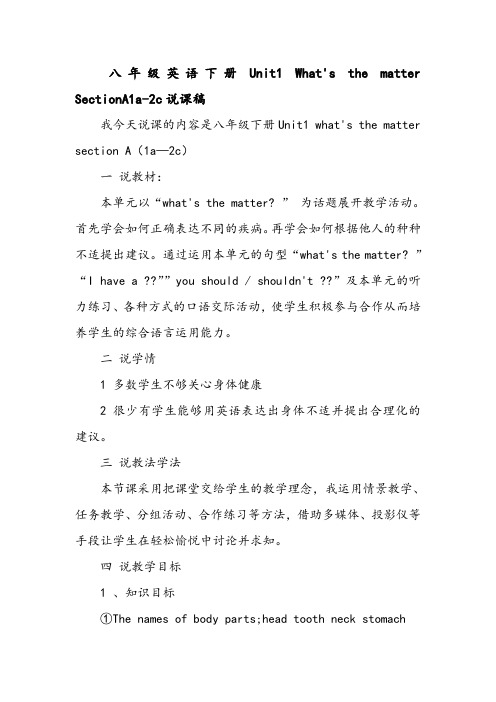
八年级英语下册Unit1 What's the matter SectionA1a-2c说课稿我今天说课的内容是八年级下册Unit1 what's the matter section A(1a—2c)一说教材:本单元以“what's the matter? ”为话题展开教学活动。
首先学会如何正确表达不同的疾病。
再学会如何根据他人的种种不适提出建议。
通过运用本单元的句型“what's the matter? ”“I have a ??””you should / shouldn't ??”及本单元的听力练习、各种方式的口语交际活动,使学生积极参与合作从而培养学生的综合语言运用能力。
二说学情1 多数学生不够关心身体健康2 很少有学生能够用英语表达出身体不适并提出合理化的建议。
三说教法学法本节课采用把课堂交给学生的教学理念,我运用情景教学、任务教学、分组活动、合作练习等方法,借助多媒体、投影仪等手段让学生在轻松愉悦中讨论并求知。
四说教学目标1 、知识目标①The names of body parts;head tooth neck stomach②illness: have a cold / have a fever ,have a sore throat , have a toothache , have a stomachache.have a headache③Advice: drink lots of wat er ,lie down and rest , drink some hot tea with ho n ey /see a dentist ,.④Dialogues : what's the matter with sb?Sb should or shouldn't??2能力目标通过此课的学习,使学生能够学会询问身体不适和给出建议3 情感目标关心身体,保持健康五说教学重难点1 listening and speaking practice2 talk about your health and give advice六教学过程Step1 :presentation:Show a body look at the picture ,teach the words of body parts , please say the words when I point th e different parts , finish off1a (老师指着幻灯片中人物身体的各个部分让学生说出单词,通过抢答调动学生的积极性,形成良好的课堂氛围)Step2: illness:Show pictures look at the pictures carefully find out what's the matter/what's wrong with them?Teacher ask:What's the matter with him? He has a feverWhat's wrong with her?She has a coldWhat's the matter with ?? ?出示几个不同的图片,猜测病情。
英语人教版八年级下册第一单元What’s-the-matter
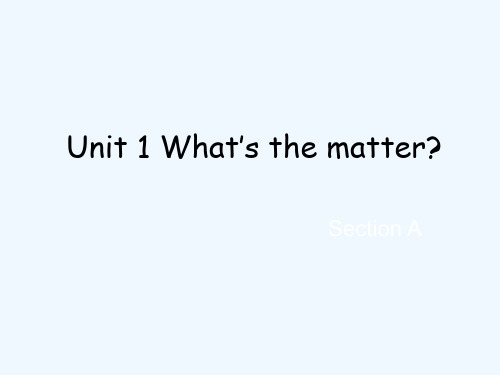
A: What’s the matter? B: I’m not feeling well.
I have a fever. A: When did it start? B: About two days ago. A: Oh, that’s too bad.
Unit 1 What’s the matter?
Section A
body
Name each part of the body
arm
ear
eye foot
leg hand
mouth
nose
tooth
neck
Follow me:
• Everybody moves your body • Nod your head and touch your face • Touch your nose and close your eyes • Touch your ears and clap your hands • Raise your arms and look at your back • Touch your stomach and tap your foot • Sit down and move your legs
What should she do? She should take some medicine.
What’s the matter with you? I have a toothache. You should see a dentist. That’s a good idea.
What’s the matter with her? She has a sore throat. What should she do?
【英语】2014春新人教版八下Unit1What’sthematter重点详解与拓展SectionB
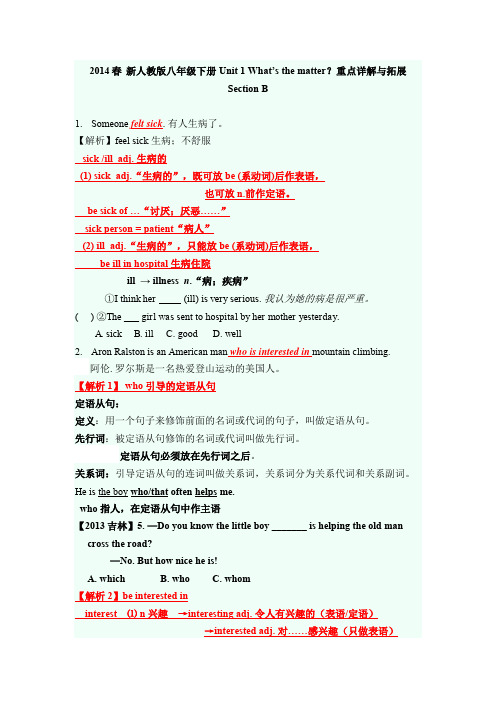
2014春新人教版八年级下册Unit 1 What’s the matter?重点详解与拓展Section B1.Someone felt sick. 有人生病了。
【解析】feel sick 生病;不舒服sick /ill adj. 生病的(1) sick adj.“生病的”,既可放be (系动词)后作表语,也可放n.前作定语。
be sick of …“讨厌;厌恶……”sick person = patient“病人”(2) ill adj.“生病的”,只能放be (系动词)后作表语,be ill in hospital 生病住院ill → illness n.“病;疾病”①I think her (ill) is very serious. 我认为她的病是很严重。
( ) ②The ___ girl was sent to hospital by her mother yesterday.A. sickB. illC. goodD. well2.Aron Ralston is an American man who is interested in mountain climbing.阿伦. 罗尔斯是一名热爱登山运动的美国人。
【解析1】 who 引导的定语从句定语从句:定义:用一个句子来修饰前面的名词或代词的句子,叫做定语从句。
先行词:被定语从句修饰的名词或代词叫做先行词。
定语从句必须放在先行词之后。
关系词:引导定语从句的连词叫做关系词,关系词分为关系代词和关系副词。
He is the boy who/that often helps me.who 指人,在定语从句中作主语【2013吉林】5. —Do you know the little boy _______ is helping the old mancross the road?—No. But how nice he is!A. whichB. whoC. whom【解析2】be interested ininterest⑴ n 兴趣→interesting adj. 令人有兴趣的(表语/定语)→interested adj. 对……感兴趣(只做表语)⑵interest v. 引起……关注;使……感兴趣be interested in sth./ doing sth.对……变得感兴趣= show great interest in sth. / doing sth.表现出对……的极大兴趣;(1) take/have an interest in =be interested in 对……感兴趣(2) places of interest 名胜 lose interest in 失去兴趣( )This book is very _____ and I am ____ in it.A. interest; interestB. interesting; interestedC. interested; interestedD. interested; interested【2013贺州】48. This movie wasn’t ______. He f ell asleep half way through it.A. interesting enoughB. enough interestingC. interested enoughD. enough interested【2013宁波】109. —What fun The Croods is!—Yeah! I like the movie, too. It's so_______.A. boringB. scaryC. interestingD. sad3.As a mountain climber, Aron is used to taking risks.作为一名登山者,阿伦习惯于冒险。
Unit1_What's_the_matter_SectionB

2 _______ clean your face. _______ put your head back. 1 _______ put on a clean T-shirt. 3
1b. Listen to the school nurse. Check the problems you hear. Treatment s
Problems
Someone felt sick.
Someone cut his knee.
Someone had a fever.
Someone had a nosebleed.
Someone hurt his back.
Someone got hit on the
1c. Listen again. Write the letter of each treatment next to the problems you checked in the chart above.
自己的手臂,并且成功的拯救了自己。 断肢六小时后由直升机救走,抢救医 生说:再晚一个小时获救的话Aron Ralston就会因失血过多而不治。 2004年Aron Ralston出版的回忆录 《Between a Rock and a Hard Place》 (《生死两难》)中详尽叙述了这段惊心 动魄的经历!而他的真实经历也被拍 成电影《127 Hours》。
Unit 1 What’s the matter ?
1a—1d
Ask and answer
A: What’s the matter with…? B: He/She…
Make sentences: give advice
She should drink a lot of water.
人教新目标八下课件:Unit1 What's the matter(Section B1 2a-2e)

反身 代词。 himself 和ourselves称为_。
第一人称 第二人称 单数 复数 myself yourself 第三人称 himself herself itself themselves
ourselves yourselves
zxxk
摔倒 对感兴趣 习惯于 因为 用完
fall down be interested in be used to … because of run out of
准备做 切除 离开 掌管,管理 继续或坚持 (做某事)
be ready to do sth.
cut off get out of … in control of … keep on doing sth.
__ __ B fall down C have problems breathing __ A get hit by a ball __ C get sunburned __ __ A hurt our back or arm B cut ourselves
2c Read the statements and circle True,
1. 观察下列句子。
1) He found himself in a very dangerous situation. 2) He was climbing by himself. 3) He bandaged himself so that he would not lose too much blood. 4) … we find ourselves “between a rock and a hard place”…
True False Don’t know
True False Don’t know
人教版八年级英语下册Unit 1 What’s the matterSection B(2a—2e)
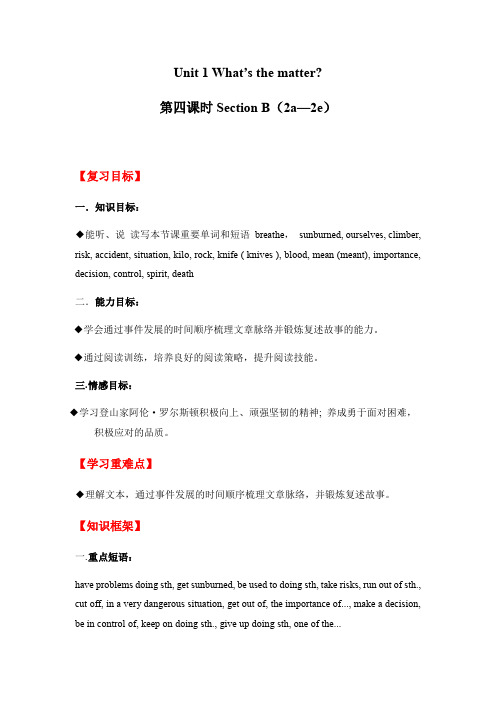
Unit 1 What’s the matter?第四课时Section B(2a—2e)【复习目标】一.知识目标:◆能听、说读写本节课重要单词和短语breathe,sunburned, ourselves, climber, risk, accident, situation, kilo, rock, knife ( knives ), blood, mean (meant), importance, decision, control, spirit, death二.能力目标:◆学会通过事件发展的时间顺序梳理文章脉络并锻炼复述故事的能力。
◆通过阅读训练,培养良好的阅读策略,提升阅读技能。
三.情感目标:◆学习登山家阿伦·罗尔斯顿积极向上、顽强坚韧的精神; 养成勇于面对困难,积极应对的品质。
【学习重难点】◆理解文本,通过事件发展的时间顺序梳理文章脉络,并锻炼复述故事。
【知识框架】一.重点短语:have problems doing sth, get sunburned, be used to doing sth, take risks, run out of sth., cut off, in a very dangerous situation, get out of, the importance of..., make a decision, be in control of, keep on doing sth., give up doing sth, one of the...二.重难点句子:1.As a moutain climber, Aron is used to taking risks.作为一名登山者,阿伦已习惯了冒险.2. But when his water ran out, he knew that he would have to do something to save his own life.但是当他的水喝光之后,他知道他必须要做点什么来挽救自己的生命.3. His love for mountain climing is so great that he kept on climbing moutains even after this experience.他对登山如此痴迷,以至于在这次断臂之后他依然继续从事登山运动.4. Let’s think about it before we find ourselves “between a rock and a hard place”, and before we have to make a decision that could mean life or death.在我们发现自己处于困境之前或在我们不得不作出生死抉择之前,让我们先思考一下吧。
八年级英语下册 Unit 1 What’s the matter Section B(1a-1d)
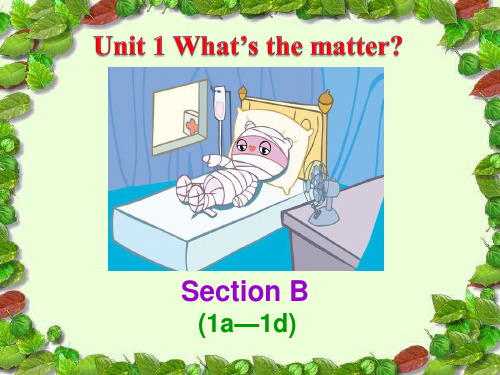
put on : 穿上
What’s the matter with him? fell down on the ground
First, go to the hospital.
Next , get an X-ray Finally, rest for a few days. 休息几天
What’s the matter?
He cut himself. What should he do? First, run it under water
Finally,put a bandage on it Next, put some medicine on it
1a
When these accidents happen, What should you do? Put the actions in order.
Run it under water. Put some medicine on it. Put a bandage on it.
hurt his leg ; (腿受伤)
get a burn [bɜːn] (烫伤);
the heart problems ; (心脏病)
fall in a faint [feɪnt](晕倒)
_1__Go to the hospital. _2__Get an X-ray. _3__Rest for a few days.
What happened to them? Jenny
school nurse
school clinic
Listen to the school nurse.
1b Check(√ )the problems you hear.
b, c
- 1、下载文档前请自行甄别文档内容的完整性,平台不提供额外的编辑、内容补充、找答案等附加服务。
- 2、"仅部分预览"的文档,不可在线预览部分如存在完整性等问题,可反馈申请退款(可完整预览的文档不适用该条件!)。
- 3、如文档侵犯您的权益,请联系客服反馈,我们会尽快为您处理(人工客服工作时间:9:00-18:30)。
Unit 1 What’s the matter
Section B2c— Self Check
Ⅰ.根据汉语意思及括号内所给英文提示语,将下列句子翻译成英语。
1.那名护士在做运动时伤了背。
(nurse, hurt)
_________________________________
2.不要放弃你的梦想。
(give up)
_________________________________
3.你不应该和他们一起去爬山。
(go mountain climbing)
_________________________________
4.我爷爷经常腿疼。
(have)
_________________________________
Ⅱ.根据短文内容,从方框中选择恰当的词语填空,有的需要变换形式。
All my classmates talked about the winter camp. And they were looking forward to it. They were sure they would enjoy (1)__________. But I wasn’t (2)__________ in it.
On arriving at the camp, the coach (教练) started to teach us how to ski (滑雪). I (3)__________ many times even though (即使) I was careful. Sometimes I (4)__________ on the ground and cried (哭) because my (5)__________ hurt badly.
“Ha! Ha!”somebody behind me started laughing. I looked back to see who was laughing at me. To my (6)__________, I saw a girl. She was in the same embarrassing (令人尴尬的) (7)__________.“Ha! I thought I’d be bad at this, but it seems more difficult than I expected!” she said to (8)__________. Hearing that, I started laughing, too.
The next day, although I didn’t want to go skiing again, I still
(9)__________ to do it. I knew no one could help me with my problem. I had to
help (10)__________. Three days later, I could ski well. Every time I skied downhill, I felt I was flying and it was wonderful.
答案:
Ⅰ. 1. That nurse hurt her back doing sports.
2. Don’t give up your dream.
3. You shouldn’t go mountain climbing with them.
4. My grandpa often has a sore leg.
Ⅱ. 1. themselves 2. interested 3. fell down
4. lay
5. knees
6. surprise
7. situation
8. herself
9. chose10. myself。
